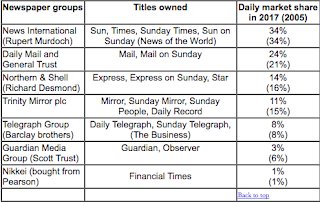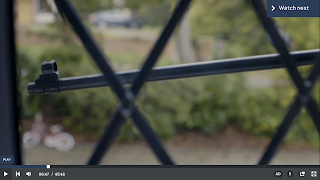Television Industry
What are the genre conventions of this product, how do they work, and how have they developed?
- Use of the bright green eyes
- Use of diegetic sound when the synths are turned on
- Awkward, robotic movements of the synths
- Mise-en-scene of the synths being clean cut with blue clothes, no blemishes on their faces, smooth hair
- Blue and white colouring is unnatural and connotes to sci-fi due to the setting being conventional of other sci-fi / dystopian films
In the show 'Humans', the genre has been developed to display an alternate reality, or an utopia world which is littered with dystopian connotations - for example, the family and the synth warehouse and their world is bright and happy and displays the synths in a stereotypical way, however Leo's search for Mia is much more dystopian and dark in comparison. There is very little sci-fi within this series however the conventions within it make it more familiar, and the other elements make it more interesting.

 On the "Persona Synthetics" website, there are lots of prooairetic and hermeneutic codes which hint at the next series or episodes of 'Humans'. By creating this company and by using this type of marketing it creates immersions, and makes the audience feel more involved with the show. It creates more of a narrative and therefore the show has much more depth.
On the "Persona Synthetics" website, there are lots of prooairetic and hermeneutic codes which hint at the next series or episodes of 'Humans'. By creating this company and by using this type of marketing it creates immersions, and makes the audience feel more involved with the show. It creates more of a narrative and therefore the show has much more depth.
The information here is interesting and the marketing of the synths shapes the program and makes it seem like the program itself is developing just like it does in real life. The use of facts and by presenting them as having this knowledge, it displays they want to keep developing the show and it keeps the audience interested in what is going to happen in the new series.
About Channel 4
- Do not produce shows in-house and instead they commission content from production companies in the UK. This means it supports a lot of businesses in the UK.
-Funded through advertising, and a small amount of TV license fee
- It's a social enterprise, and so it puts all profit back into the channel.
- They call themselves the people's channel, and they are very diverse.
- The first film they showed was "Le age d'or" a French surrealist/experimental film, which was banned in the 80s (but they showed it anyway, hehe)
-Some notable releases are Big Brother, Hollyoaks, Gogglebox, The Inbetweeners, Embarrassing bodies and The Great British Bake Off
-Makes full use of the watershed, and has been criticised for offensive and adult content
'Humans' Target Audience
Age: 37
Gender: Male
Nationality: British
Location: Surrey
Sexuality: Heterosexual
Occupation: Engineer
Car: Honda CRV
Hobbies: Cycling (literally a man in lycra)
Class: Middle Class
Advertising
TV shows aren't sold to the advertisers, the audience is.
Breakfast Scene
-Establishing shot of the kitchen and breakfast - the middle class nature of this scene creates something aspirational for the audience
-Low angle shot of Joe makes him seem more authoritative
-Close-up of Laura's face shows her disapproval
-Mid shot of Anita laughing is quite drawn out, emphasises creepiness
-Pan of mise-en-scene of table spread
-Close up of Anita cleaning
-Joe has a low-key dig at Laura, undermining her position by saying "this is what breakfast is supposed to be like"
-Provides a Hyper-real fantasy aspiration for a middle class audience
-Unconventional to Sci-Fi, yet conventional to a Sit-Com show
- The different aspects make it more interesting because people want to see what will happen as they aren't sure what to expect
-Creates debate
FANBASE: Reddit
- Use of the bright green eyes
- Use of diegetic sound when the synths are turned on
- Awkward, robotic movements of the synths
- Mise-en-scene of the synths being clean cut with blue clothes, no blemishes on their faces, smooth hair
- Blue and white colouring is unnatural and connotes to sci-fi due to the setting being conventional of other sci-fi / dystopian films
In the show 'Humans', the genre has been developed to display an alternate reality, or an utopia world which is littered with dystopian connotations - for example, the family and the synth warehouse and their world is bright and happy and displays the synths in a stereotypical way, however Leo's search for Mia is much more dystopian and dark in comparison. There is very little sci-fi within this series however the conventions within it make it more familiar, and the other elements make it more interesting.

 On the "Persona Synthetics" website, there are lots of prooairetic and hermeneutic codes which hint at the next series or episodes of 'Humans'. By creating this company and by using this type of marketing it creates immersions, and makes the audience feel more involved with the show. It creates more of a narrative and therefore the show has much more depth.
On the "Persona Synthetics" website, there are lots of prooairetic and hermeneutic codes which hint at the next series or episodes of 'Humans'. By creating this company and by using this type of marketing it creates immersions, and makes the audience feel more involved with the show. It creates more of a narrative and therefore the show has much more depth.The information here is interesting and the marketing of the synths shapes the program and makes it seem like the program itself is developing just like it does in real life. The use of facts and by presenting them as having this knowledge, it displays they want to keep developing the show and it keeps the audience interested in what is going to happen in the new series.
About Channel 4
- Do not produce shows in-house and instead they commission content from production companies in the UK. This means it supports a lot of businesses in the UK.
-Funded through advertising, and a small amount of TV license fee
- It's a social enterprise, and so it puts all profit back into the channel.
- They call themselves the people's channel, and they are very diverse.
- The first film they showed was "Le age d'or" a French surrealist/experimental film, which was banned in the 80s (but they showed it anyway, hehe)
-Some notable releases are Big Brother, Hollyoaks, Gogglebox, The Inbetweeners, Embarrassing bodies and The Great British Bake Off
-Makes full use of the watershed, and has been criticised for offensive and adult content
'Humans' Target Audience
Age: 37
Gender: Male
Nationality: British
Location: Surrey
Sexuality: Heterosexual
Occupation: Engineer
Car: Honda CRV
Hobbies: Cycling (literally a man in lycra)
Class: Middle Class
Advertising
TV shows aren't sold to the advertisers, the audience is.
Breakfast Scene
-Establishing shot of the kitchen and breakfast - the middle class nature of this scene creates something aspirational for the audience
-Low angle shot of Joe makes him seem more authoritative
-Close-up of Laura's face shows her disapproval
-Mid shot of Anita laughing is quite drawn out, emphasises creepiness
-Pan of mise-en-scene of table spread
-Close up of Anita cleaning
-Joe has a low-key dig at Laura, undermining her position by saying "this is what breakfast is supposed to be like"
-Provides a Hyper-real fantasy aspiration for a middle class audience
-Unconventional to Sci-Fi, yet conventional to a Sit-Com show
- The different aspects make it more interesting because people want to see what will happen as they aren't sure what to expect
-Creates debate
FANBASE: Reddit





Comments
Post a Comment